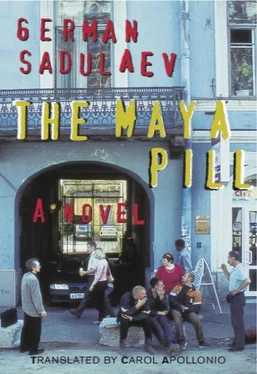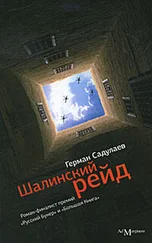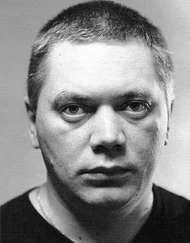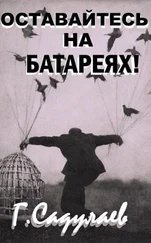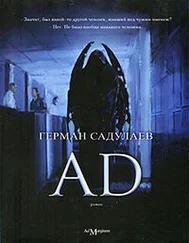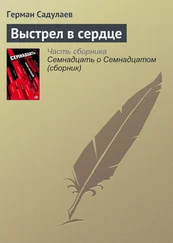All fell silent. A portable throne was brought out and the crowd cried out, summoning the new Khagan:
“Khagan! Khagan! Kha-gan!”
The Great Bek roused the crowd:
“You call that a chant? The Khagan will not come forth, there will be no celebration, unless you let him hear you!”
And they shouted louder:
“Kha-gan! Kha-gan! Kha-gan! Grandfather Kha-gan!”
Someone poked Saat lightly on the back, and he emerged from the secret room into the great hall.
“Hurra-a-a-a-a-a-ah!”
The crowd roared, and loud music filled the hall. And Saat, embarrassed and blushing bright red like a fish from the Itil, approached the throne and took his seat. Oh, it’s hot in the hall, so hot! Hot as a skillet!
The Bek spoke:
“Here he is, great Khazars, sovereign people, our new Khagan, Osya the Thirteenth! Let us be loyal to him, as we were loyal to his forebears, ancient Khagans from the beginning of time!”
“We will be loyal!” shouted the people. “We will!”
And again the Great Bek pounded the floor with his crook: silence!
“First we must observe our ancient tradition and test the new Khagan, to determine the duration of his rule.”
From behind the Khagan’s back emerged an executioner arrayed in camouflage from head to toe, branches sewed onto his clothing, his face covered with a black stocking with holes cut for the eyes. Now this was a surprise! No one had said anything to Saat about this.
The executioner came up behind Saat and wound a fine silken noose around his neck. So this is the end. It wasn’t your destiny to fall and rot on the field of battle, nor were you fated to end your days in poverty and starvation; no, Saat, in celebration and revelry are you to perish, in peacetime, amid sweet feasting, to the sound of joyful music. Such is human life: There is no escaping death!
Saat thought this thought, then stood calmly, prepared to meet his eternal rest. But the Great Bek came up before him.
He spoke:
“Tell us, Saat, son of Nattukh, how long will you rule as Khagan of Khazaria? The executioner will begin to strangle you, and you will speak the numbers—count up from one, leaving no number out! And when you can go on no longer, lift your right hand and speak, say you have had enough. Then we will know.”
And the Great Bek gave a sign to the executioner, then stepped to one side. The executioner pulled the silken noose lightly toward himself. Saat began counting:
“One, two…”
The executioner pulled tighter on the silk string, oh, how it hurt!
“Three, four…”
And now Saat’s strength was failing; he couldn’t go on, the light went dark, the crowd multiplied and oscillated before his eyes; the people flailed about in a demonic dance. But Saat strained with all his might:
“Five, six, seven…”
And he felt that he could not possibly go on; he was drained. Death was upon him. He lifted his hand and rasped out: “Enough!”
The executioner immediately released the noose; servants rushed forth to pour water over the Khagan, to fan him, to rub his neck gently with fine oil.
“Glory to the Khagan!” howled the Khazar elite.
And the Great Bek spoke:
“You have spoken, O Khagan! Your time on the throne ruling the land of the Khazars is to be seven terms. And after that your body will be hewed into seven pieces, and into every piece will enter the sins of the Khazar land, one piece for every year of your rule, and we will curse and revile you, and will burn the pieces of your body. Now, though, you are to give no thought to yourself, for it is clear what is to be your fate. Your mind is free for the concerns of the realm!” Touched, the Great Bek shed a tender tear. And Saat rose from the throne and blessed his people. And a sweet fog billowed up and filled the air of the hall. And a ringing sound… a ringing sound filled every corner… but where was the sound coming from?
In Saat’s… uh, Maximus’s, apartment, the alarm clock was emitting a metallic ringing sound. Recently an entire delegation of his neighbors in the apartment building had presented him with a formal request that he keep the volume down in the morning. How they had managed to persuade him, Semipyatnitsky would not reveal, but now he had to use an ordinary alarm clock to waken him into this reality so that he could get himself to work on time.
His first order of business every morning was to solve the problem of his identity, that is, to answer two questions: Who was he, and why did he have to get up this exact minute and go out somewhere? The answer to the second question was to flow naturally from the answer to the first.
Maximus said to himself: I am a middle manager in the Import Department of the Cold Plus Company, in St. Petersburg, Russia. Tenant in an apartment located at 6-66 Dybenko Street. Debtor, signatory on three different loans. Hence, whether I want to or not, I must quit my bed now, hasten to the bathroom, and shave. And then get dressed and go to the office. There is no other option.
Semipyatnitsky thought it would make sense to write this mantra down on a piece of paper and simply read it out loud to himself every morning. Or, even better, record it on tape and set it to play… wait, a tape player wouldn’t work; it would bring on the neighbors again.
The neighbors… they were such pests! Not just the neighbors; people everywhere were generally just as bad. But only God is perfectly beautiful, anyway. As it says in the Hadith: “Allah is beautiful and loves beauty.” And if that’s the case, then He doesn’t love people. Why should he? And why should I?
Preoccupied with these and other deep thoughts, Semipyatnitsky somehow made his way to work. He was desperately thirsty. He tossed his briefcase and car keys onto his desk and headed for the break room, where employees who couldn’t even afford the Barf Bar could sit and eat the snacks or lunch that they had packed and brought from home.
There was only one person there, a girl nibbling at a thin sandwich, chasing down every piece with a sip of watery instant coffee from the office stash, which was kept in a giant economy-size bag on the counter. This was the very same coffee that was left over in the form of a fine powder after the best beans—according to the ads for this particular brand—were taken from the unfortunate Africans.
Maximus politely initiated a conversation.
“Morning! Still asleep?”
“Yes, I could barely get myself to work this morning. All I wanted to do was stay in bed.”
As if anyone actually wanted to come to work! Maximus himself, no matter how he tried, couldn’t come up with any convincing arguments for it, except for the threat of being kicked out of his apartment and losing his car and starving to death. On a practical level, these arguments made perfect sense, but philosophically speaking they were inadequate. Maximus launched into a tirade:
“For a man of our day and age the Shakespearian question ‘to be or not to be’ is no longer of any relevance. To be—of course, what’s the alternative? For some extremists, like the skinheads, the question becomes ‘to beat or not to beat,’ but they got their answer long ago, which is why they decided to shave their heads. But they’re the minority. For the majority of people, the key existential question today is: ‘to go to the office or to let it all go to hell?’ Considering the fact that society won’t allow you to live for free, once you’ve dispensed with office work you’re left with the following options: You can become a prostitute on the street, in a salon, or in a virtual chat room. You can become a drug dealer: sit at home in your apartment, aka drug den; poke around on the Internet and the client will show up on his own. You can get into direct sales—Herbalife or vacuum cleaners that cost as much as used cars. Or you can sign a contract with the devil, and he’ll make you a rock star, a popular writer, a celebrity, or some other brand of high-profile parasite. And in return you sign over your soul. What your soul is, and why you need it—you don’t know yourself. But the devil, well, the devil knows who needs it and why…”
Читать дальше
